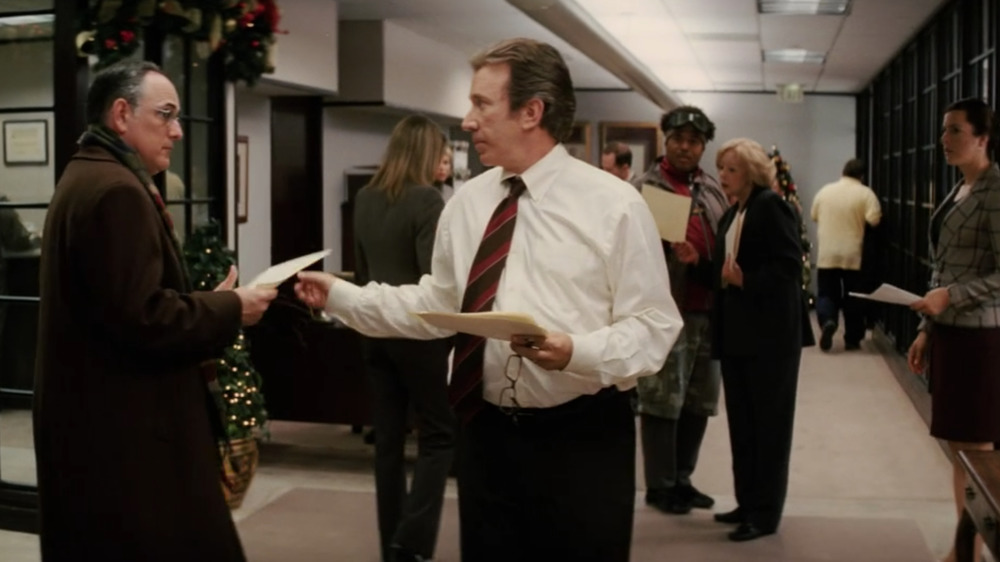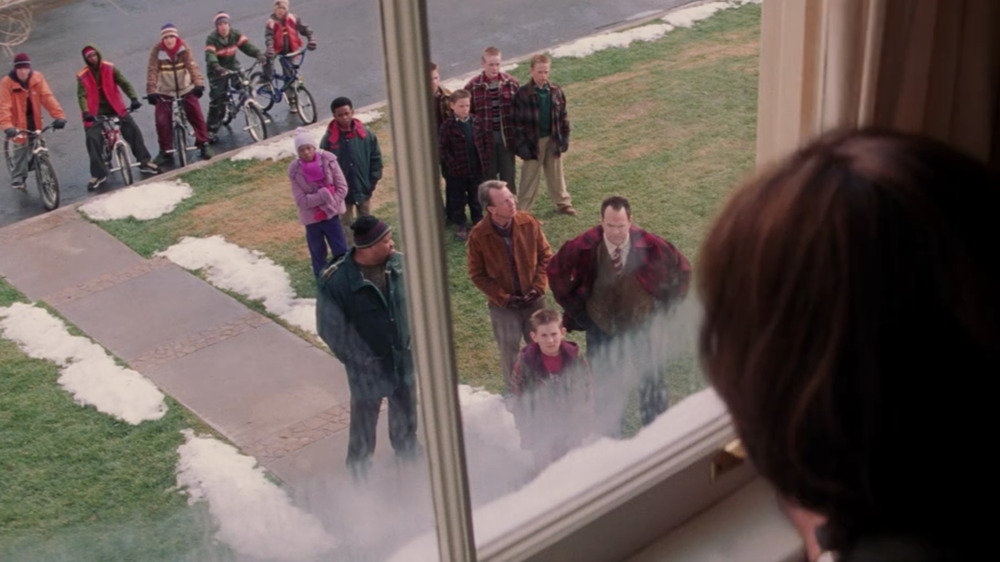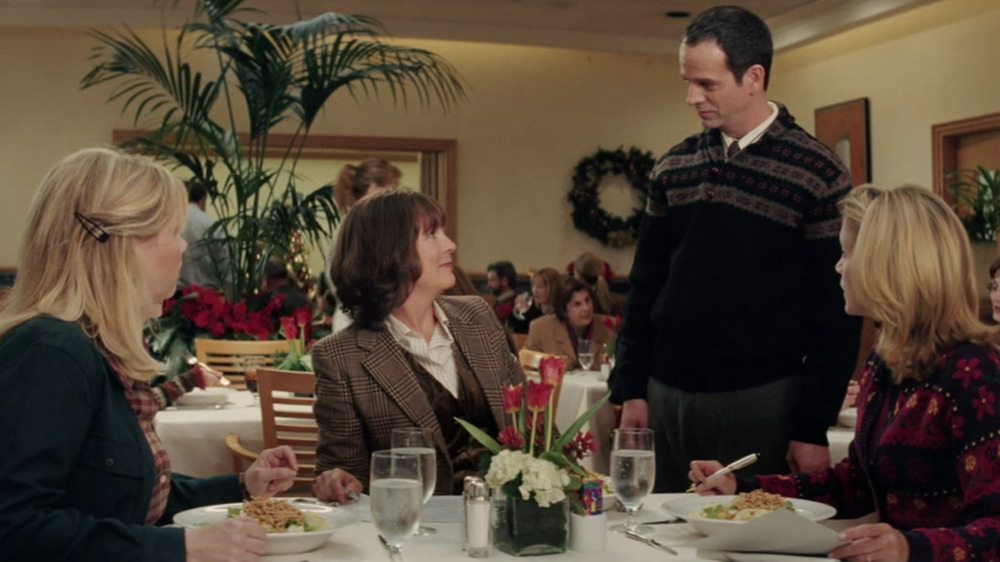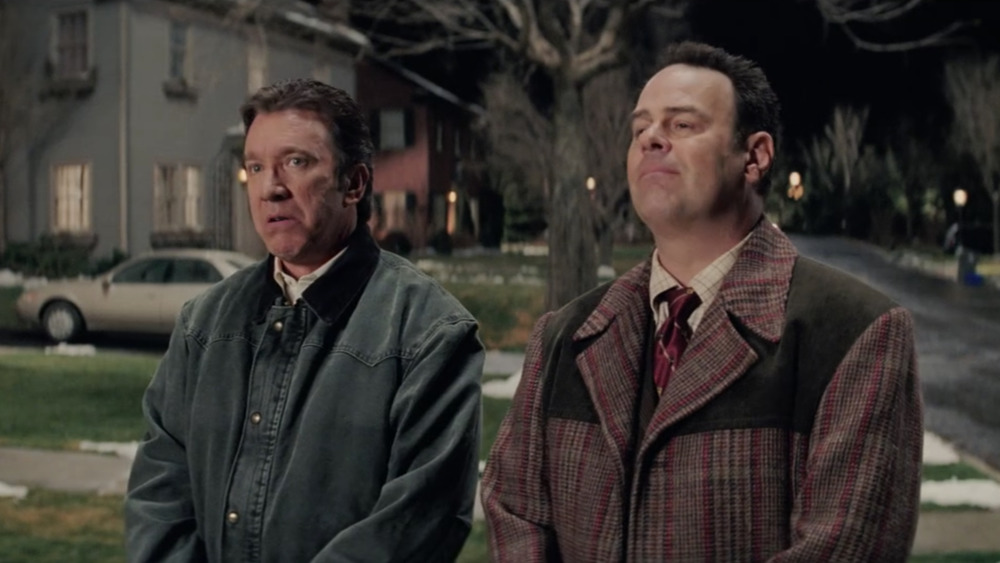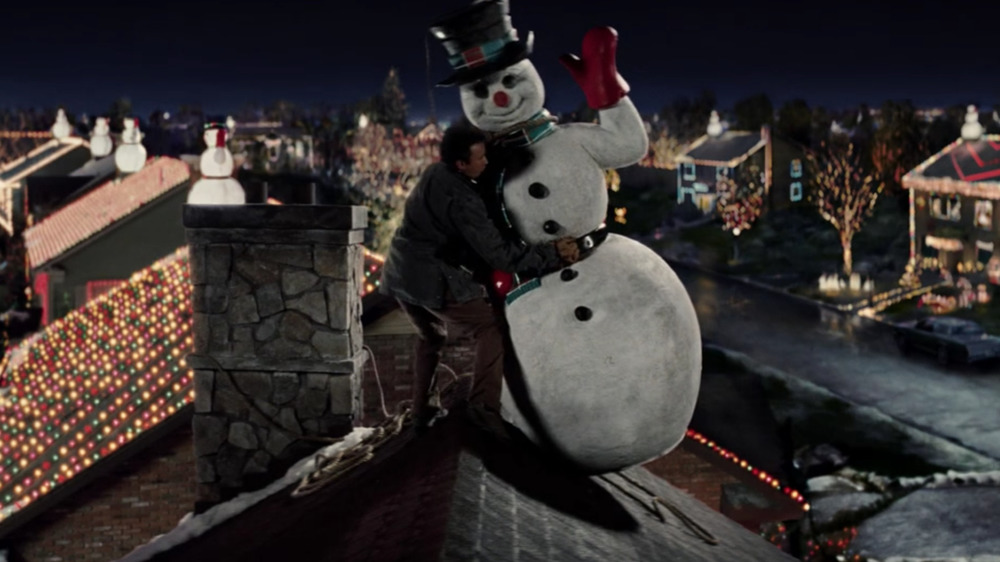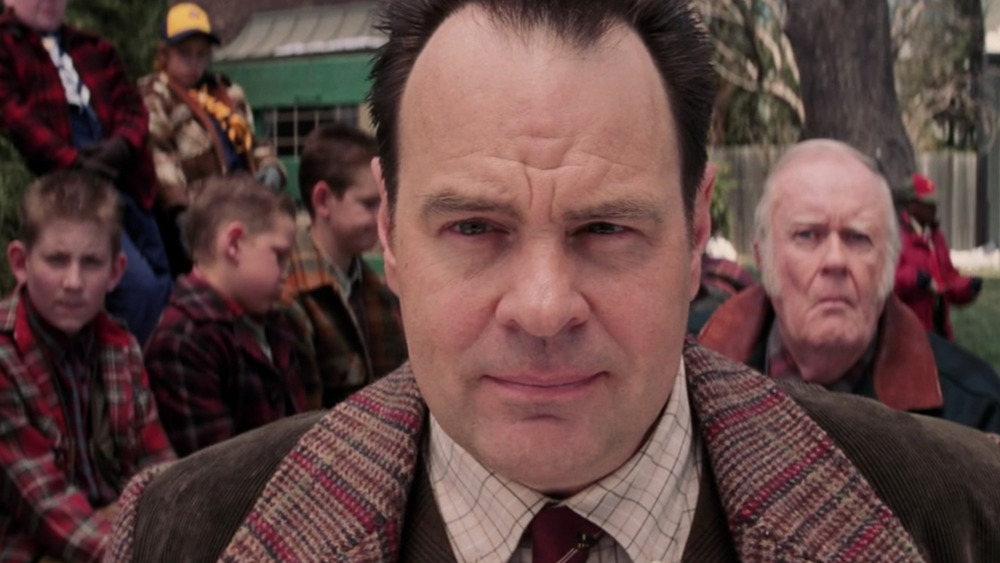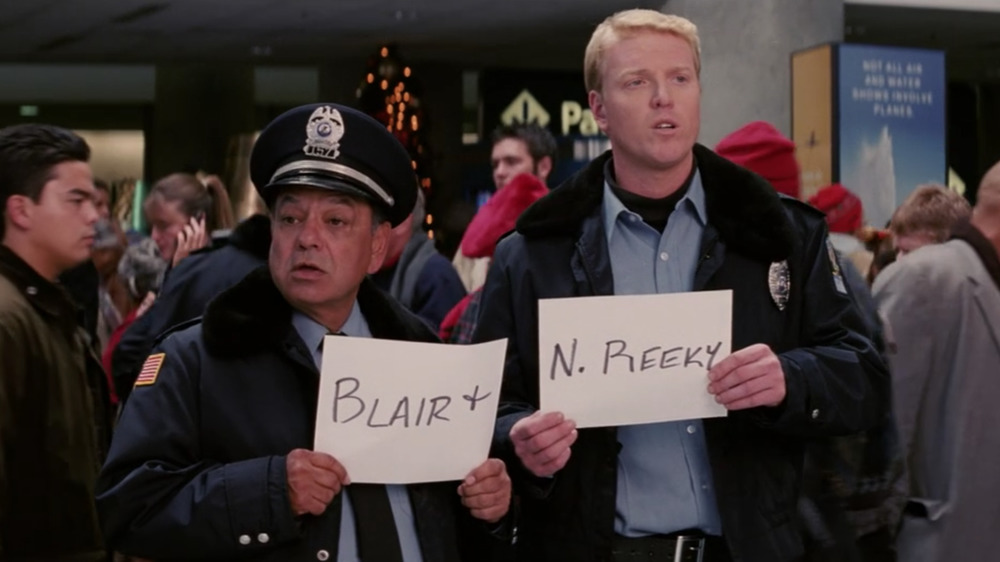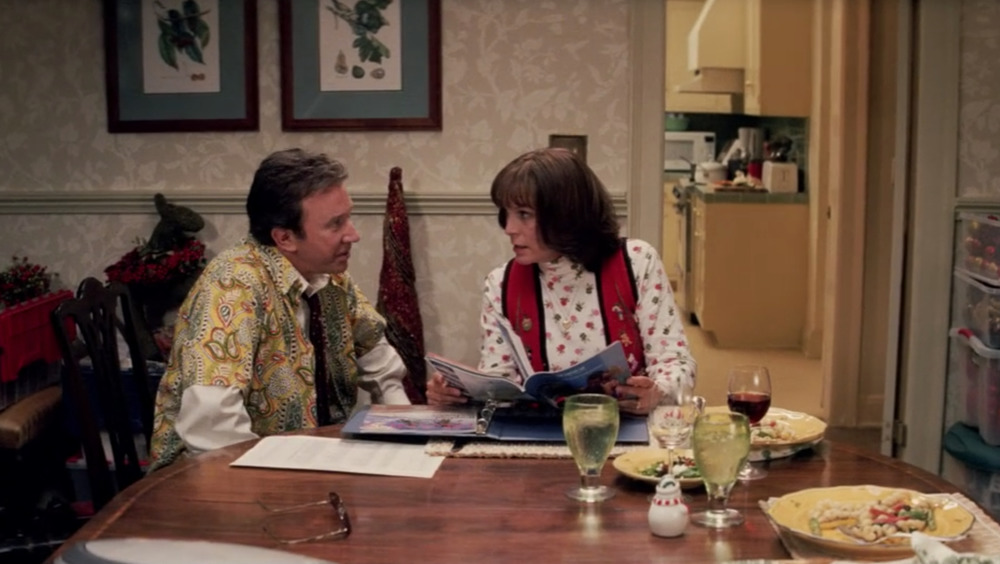Things Only Adults Notice In Christmas With The Kranks
Christmas with the Kranks isn't the most critically acclaimed holiday movie of all time. With a 5 percent rating on Rotten Tomatoes, there may not be much love lost on this film. Yet as a family-friendly comedy that receives a lot of annual viewings, it's seasoned with details that go over younger viewers' heads.
Released in 2004, Christmas with the Kranks is based on John Grisham's 2001 novel Skipping Christmas. The story follows Luther Krank (Tim Allen), a toned-down Ebenezer Scrooge type who wants to skip Christmas for a year and instead go on a cruise with his wife Nora (Jamie Lee Curtis). Nora and Luther have recently become empty nesters, and they miss their daughter Blair (Julie Gonzalo), who's ventured to Peru for the Peace Corps. They'll do anything to forget this time of year without her in their presence. Because skipping the holidays is somehow a mortal sin in this Christmas story, the Kranks receive a plethora of hate and peer pressure from their neighbors — until, of course, their daughter surprises them by coming home on Christmas Eve, and the same neighbors who've harassed them for an entire movie come together as a community to help the Kranks plan a last-minute Christmas party.
Despite this picture not being a perfect film, the Kranks get their happy ending — and along the way, there are certain elements of the story that will go unnoticed by younger audience members. Get ready to (sort of) celebrate the season with the Kranks, because we're here to reveal things only adults notice in Christmas with the Kranks.
Luther Krank unfairly comes off as selfish
Luther might seem like a bona fide Grinch who's trying to ruin the holidays for everyone, but his plan is simple and justified: Luther wants to save money by not spending money on all the unnecessary marketing schemes that accompany Christmas, such as lights, decorations, and a tree. Instead, he wants to embark on a cruise on Christmas Day. This excursion will allow Luther and Nora to finally get away and enjoy some much needed time in each other's company. Best of all? Planning for a cruise, and all the anticipation that comes with going on a Caribbean trip, will help to get Nora's mind off the fact that Blair won't be home for Christmas for the first time in 23 years.
Sure, it's easy for a younger mind to see the flaws in Luther's plan, as holiday movies make villains out of people who don't spread Christmas cheer by singing loud for all to hear. But Luther is trying to get Nora's mind off their daughter not being home — and dwelling on her absence, a situation Nora and Luther can't control, isn't healthy.
The Kranks could have just kept quiet
Luther and Nora are adults and they're allowed to do whatever they want. Looking back, however, it's hard not to notice that, although they had a good plan, their execution is questionable. Luther didn't need to attend the office Christmas party, but he mistakenly tries to get ahead of the situation by writing a letter to his colleagues that states he's skipping anything and everything that's associated with Christmastime.
This act only puts a target on his back. While getting out of their annually held Christmas party proves trickier, since many people attend and look forward to the Kranks' Christmas Eve celebration every year, the fact of the matter is, the Kranks have a plane to catch the next day. The last thing they want is to have to clean up after a large house party on the morning of their vacation — and heaven forbid if they're hung over or miss their flight. Luther also didn't have to tell people anything because it's none of their business, but that's not very cheerful during "the most wonderful time of the year."
But logical thinking goes against the framework of "skipping Christmas" in peace. Yes, the Kranks would have been better off if they kept their plans a secret and subtlety played along when they had to, but then their story wouldn't have been as special and the ending wouldn't have been as climactic.
The Kranks' neighbors are undeniably overzealous
At times, the behavior of the Kranks' neighbors makes this film seem more like a horror movie than a family-friendly picture. In one instance, Vic Frohmeyer (Dan Aykroyd), inexplicably the most important and powerful person in the neighborhood, tries to stop Nora from driving away from her house by putting his hands inside her window and trying to get her to stop. His intentions are simple — he wants Nora to put up Frosty, a holiday decoration that the entire block partakes in each year. But instead of having a civilized conversation, Vic tries to physically stop a moving vehicle. It's no wonder the Kranks are trying to skip Christmas. This community is so involved that the neighborhood even bakes cookies and swaps gifts. The nerve.
Throughout the movie, Luther and Nora are harassed by their neighbors because they can't accept the fact that the Kranks don't want to celebrate Christmas for one year. As a seasoned viewer, it's hard not to notice the peer pressure. Case in point: The neighbor kids won't stop calling the Kranks and pleading for Frosty to be "freed." The neighbors also have a Christmas caroling group stand outside the Kranks' home and they sing a song over and over again.
The town residents rely on the Kranks too much
It's not just the neighbors who have lost it — the entire town cares a little too much about the Kranks' boycotting. A store clerk, after all, tries to hustle Nora into buying her annual Christmas cards. Even after she says she won't be needing them this year, the man interrupts her meal, at a restaurant, to pester her into buying the cards. She refuses and he tells the entire restaurant about her holiday "wrongdoings." Said entire restaurant proceeds to look at Nora like she's the spawn of Satan. Throughout the movie, other organizations and individuals attempt to pressure the Kranks into donating money after they'd already donated to the hospital and a church. Nora also serves food for the Salvation Army and reads to kids at a local hospital.
Just how important are the Kranks? In another scene, Nora and Luther make the front page of the newspaper after, once again, proclaiming their wishes of wanting to skip Christmas. It's already been said, but it bears repeating: No wonder the Kranks want to skip Christmas. They can't seem to catch a break from a town of needy people.
Luther wants to boycott the holidays, but American cruises still celebrate
Luther has every right to boycott Christmas. With that said, he tells Nora that it's a total boycott, meaning no decorations, no Christmas tree, and no small annual donations to people of the community, such as the Boy Scouts and the police station. What Luther doesn't realize, and what this movie doesn't mention, is that American cruises still tend to celebrate the holidays. This might seem like picking nits, but it's an important thing to bring up because Luther is so adamant about not having decorations in or around his house.
American cruises, at the least, decorate the ship and play holiday music. If the Kranks' cruise was after Christmas (and most of it is), then sure, they can dodge the holidays to an extent, but the ship leaves on Christmas Day. The important thing, of course, is that Luther escapes his normal holiday traditions in the neediest town in America, but it's hard not to notice that Christmas will still occur everywhere they go, especially on the ship... Unless the brochure advertises "We don't celebrate Christmas," which seems like an odd marketing scheme.
Setting up Frosty seems extremely dangerous
Certain Christmas traditions, like an outdated hairstyle, should be left in the past. Frosty is Christmas with the Kranks' mullet. Frosty, short for Frosty the Snowman, is a 7-foot version of the magical Christmas character. There is, however, nothing magical about this holiday decoration.
Every household of the snow-covered Hemlock Street is expected to set up the gigantic Frosty every year. It's a tradition, so no one seems to question it. That is, until, Luther boycotts Christmas, which includes the outdated decoration. Frosty isn't light and isn't inflatable, making it a rather challenging task to put on top of a house. Snow also covers the streets and this story takes place in Chicago during December — it's freezing! In two different attempts to try and set up Frosty, Luther falls off his roof — and a neighbor gets stuck on the roof, frozen to Frosty and morphing into a human icicle. Even with the help of fellow neighbors, Hemlock Street is in serious need of a new Christmas mascot. The concept of Frosty isn't the problem, and it's not hard for more seasoned audience members to notice that the 7-foot decoration should be replaced with something more practical.
Nora not wanting Blair to find out about the cruise isn't justified
Nora rightfully wants to change her and Luther's plans after she finds out Blair and her fiancé Enrique (René Lavan) are coming home for Christmas. Throwing a party, despite not having food, drinks, or guests, also isn't the crazy part. What's absurd is that Nora doesn't want Blair to know they were planning to skip Christmas. At this point, who cares? Sure, Blair might feel bad that she sprung a visit on her parents at the last minute, which leads to them having to bail on their $3,000 cruise, but Nora goes above and beyond for her daughter to not find out. If anything, Blair has some explaining to do. While Blair has every right to marry Enrique, and the movie subtly references that they were friends before embarking for the Peace Corps, she gets engaged to a man she wasn't even dating prior to leaving for her trip a few weeks earlier.
And, well, Nora puts added pressure on herself and Luther by attempting to throw their annual Christmas party just hours before Blair is expected to arrive. One would assume Nora would want to spend time with her daughter and fiancé without others around. Not to mention all their friends already have plans, so they start inviting anyone willing to attend. But alas, Blair wants to show Enrique what an American Christmas is all about, raising the expectations even higher on the party. Covering up Luther's tan with makeup and trying to throw a magical Christmas bash just seems like unnecessary pressure for the sake of pressure. Blair is probably going to find out at some point that her parents, who missed their daughter beyond belief, originally planned on skipping Christmas. What's the problem with that?
How does Vic Frohmeyer have so much power in this town?
Vic runs the neighborhood, but his authority expands much further than the leader of the neighborhood watch. Vic, in one instance, tells the cops that they need to pick up Blair and Enrique from the airport on Christmas Eve. They're rightfully hesitant, as picking up citizens likely isn't in their job description, but Vic responds by threatening to talk to the chief of police. Terrified, they agree to pick up the young couple. Just how much further does Vic's power go? Well, in another instance, the power goes out on the entire block. Vic apparently controls the power and electric company as well, as he has a worker come to the street — reminder, it's the evening before Christmas — to fix it. It's one thing to be head of the committee for Frosty; it's a whole different story to control the police and the electric company. Vic's authority is never explained, yet he runs the neighborhood like a mob boss.
The cops picking up Blair and her fiancé from the airport is a terrible use of taxpayers' money
To expand on the point above about the authorities, airport pickup service is a terrible waste of taxpayers' money. But the cops pick up the couple regardless, and then they waste more time by stalling because the party isn't fully set up. And then the cops make it seem like they received a call to check out a crime scene and they, against all odds, spot a person in the act of breaking and entering. They proceed to arrest this person and place him in the police car with Blair and Enrique. They arrive at the party and instead of dropping off Blair and Enrique and taking this man to jail, they leave him in the car and attend the party. This man tricks a neighborhood kid into letting him go and he steals valuables from the Kranks' home. He's eventually apprehended and no one gets hurt, but it's hard not to notice, given all of that, how badly this situation could have played out. It's the holidays and everyone deserves time off, but the cops were on the clock and, quite frankly, squandering resources and ignoring their moral duties.
The whole Marty bit is a little creepy
Who the heck is Marty?
Okay, so Nora meets a man named Marty (Austin Pendleton) at the store. He knows Nora, along with her daughter, which should raise some red flags as Nora has no clue who he is. But she invites him to her Christmas party regardless because she's desperate for guests. At the party, Marty knows many attendees, although none of them know who he is. Because he's not causing any trouble, he's allowed to stay. Fast forward to Marty in a Santa costume, and Luther finally puts two and two together: Marty is the man who offered him an umbrella at the beginning of the movie. Marty knows other guests because he's the umbrella Santa and has crossed paths with most of the people at the party at one time or another while passing out umbrellas during storms. While Marty ends up being harmless, the whole situation is a little creepy. Even after Luther finds out that Marty is Santa, it's still evident that he doesn't have a relationship with this man, yet he roamed free at the party. No harm, no foul?
Christmas with the Kranks reeks with privilege
It's not polite to count other people's money, let alone tell them how they should spend it — but the problems with Christmas with the Kranks are trivial at best, and the entire movie reeks of privilege. The only actual devastating blow is Bev Scheel's (Elizabeth Franz) cancer coming back, but even that problem is glossed over when Luther gifts her and Walt (M. Emmet Walsh) the cruise package. The Kranks spent $6,100 on Christmas the year prior. Not all of that money was decked with luxury as some of it did go to charity. Even still, some families can't even afford to put dinner on the table at Christmas.
The point being, a lot of privilege is pumped into this household and their biggest problem, minus Blair doing something truly special for people in need, is that they have to deal with their nosy neighbors. The Kranks not throwing a Christmas party or celebrating, for that matter, is apparently the worst thing anyone in this neighborhood is dealing with.
In the end, none of these inconsistencies matter all that much: Viewers are either going to love or hate this movie. And, well, Blair gets to show her fiancé what an American Christmas is all about. Bev and Walt get a surprise cruise vacation. Luther and Nora find peace and happiness despite their plans changing and the holidays being harder than they needed to be. Christmas with the Kranks might land differently for kids and adults, but all viewers can come together in appreciating its holiday spirit.


